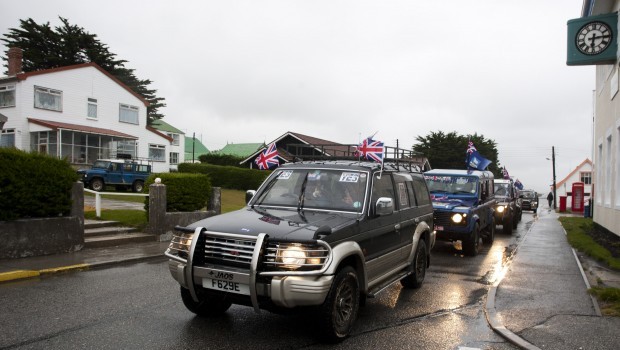
People drive their vehicles bearing British flags and stickers in favor of keeping the Falkland Islands as an overseas territory of the United Kingdom in Port Stanley, Falkland Islands, Saturday, March 9, 2013. (AP Photo/Paul Byrne)
London, AFP—Falkland Islanders are holding a referendum on Sunday and Monday to send a message to the world that they want to stay British in defiance of increasingly bellicose claims to the territory by Argentina.
Buenos Aires has however already dismissed the vote as meaningless, saying it will not affect its dispute with Britain over the South Atlantic islands which sparked a brief but bloody war in 1982.
In a move instigated by residents themselves, 1,672 eligible voters are being asked whether they want the Falklands to remain an internally self-governing British overseas territory.
Homes and shops across the archipelago are festooned with posters urging people to vote “yes” as well as the British Union Jack and the deep blue Falklands flag, which has the Union Jack in one corner and a crest with a sheep in the middle.
The result, due overnight on Monday, is not in doubt but the scale of the ‘yes’ vote will be closely watched as a sign of the Falklanders’ strength of feeling.
“People realize the importance of a high turnout because that is what is important,” Barry Elsby, a member of the island’s legislative assembly, told Sky News.
“It is showing the world that the majority of the people here want to remain as we are. We don’t want to become a colony of Argentina.”
The referendum is a logistical challenge across an inhospitable territory of 12,000 square kilometers (4,700 square miles), and organizers are sending out mobile ballot boxes by plane and by Land Rover to ensure everyone will have a chance to vote.
Four-fifths of the 2,563 residents live in the capital Stanley, with its pubs and red telephone boxes, but several hundred are scattered in sheep farms and settlements across the rugged area beyond, known collectively as “Camp”.
Britain has held the barren islands since 1833 but Buenos Aires claims what it calls “Las Malvinas” are occupied Argentinian territory.
Diplomatic tensions have risen in recent years, fueled by the discovery of oil near the Falklands, with Argentine President Cristina Kirchner ramping up her demands for the island’s return.
The ambassador to Britain, Alicia Castro, this weekend branded the referendum “utterly meaningless” from the perspective of international law.
“Its predictable outcome neither ends the dispute nor affects Argentina’s unquestionable rights,” she told Infobae news from London.
But Falklanders hope the referendum result will arm them with an unambiguous message to take to other capitals when pressing their case for acceptance on the international stage.
The United States, for example, has studiously avoided taking sides on the issue despite its close ties with Britain.
Across the islands, posters emulating a British military recruitment campaign from World War I urge residents to vote, while a vehicle rally was planned on Sunday afternoon through Stanley.
At least 30 Land Rovers were also lined up on Saturday to spell “YES” on a patch of land opposite Stanley that has historically been used by Royal Navy vessels to commemorate their vessels.
“I’m quite proud to be a British overseas territory,” sheep farmer Ailsa Heathman told Britain’s ITV news.
The Penguin News, the local newspaper named after the flightless birds that are native to the Falklands, urged residents to show their support for the vote to the visiting media.
“When you pass journalists open your window, smile, wave or give the thumbs up,” it wrote. “Face painting, especially with children, is encouraged. Please bring your flags.”
Argentina, 400 kilometers (250 miles) away, has branded the referendum “illegal” because, it claims, the islanders are “implanted” and thus do not have the right to self-determination.
The Argentinian foreign ministry said on Friday that the vote was “a British attempt to manipulate” the status of the archipelago.
London says it will not discuss sovereignty issues with Buenos Aires unless the islanders expressly wish it.
A YouGov opinion poll for Sky News published on Saturday found that 24 percent of Argentinians surveyed said the Falklands was the most important foreign policy issue, against just one percent of Britons.
But a ComRes poll for ITV news showed that 77 percent of Britons thought the Falklanders should decide their future, and 60 percent believed London should keep military options open against any threat to the islands.
On April 2, 1982, Argentina’s then-ruling junta invaded the Falklands, sparking a 74-day war with Britain which cost the lives of 649 Argentine and 255 British troops.
If the invasion hardened the minds of the staunchly pro-British islanders, Kirchner’s tub-thumping has done likewise for a whole new generation.
“The only people who can really decide what is in their best interests are the Falkland Islanders,” Dick Sawle, another of the islands’ eight elected legislative assembly members, told AFP.
Diplomatic friction between Argentina and Britain has intensified since 2010, when London authorized oil prospecting in the waters around the islands.
But Falkland Islanders suspect Kirchner’s often-emotional crusade is a ruse to divert domestic attention away from Argentina’s mounting economic problems.
Several international observers, many of them from Latin America, are monitoring the polls, which are open between 1300 and 2100 GMT on Sunday and Monday.
